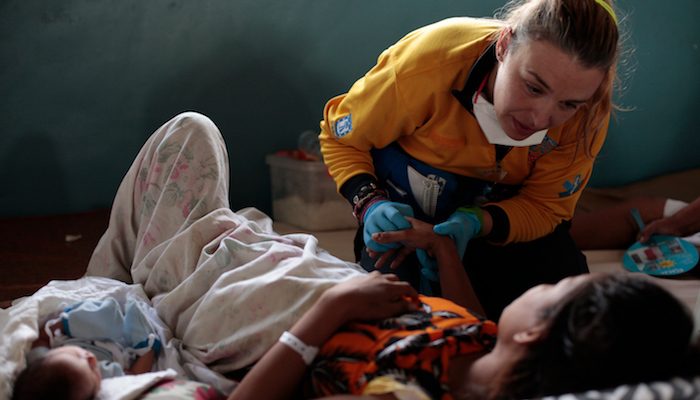
The first ever World Humanitarian Summit will be convened in Istanbul by UN Secretary General Ban Ki-moon on 23-24 May 2016. This comes with the recognition that the world’s response to humanitarian crises is itself in crisis, as conflicts seem to go on for ever, record numbers of people are forcibly displaced, and the numbers and magnitude of disasters reach new heights.
With tens of millions of our fellow humans trapped in recurrent cycles of misfortune and adversity, humanitarians have never been so busy. But with needs outstripping resources, and trends such as climate change indicating harder times ahead, business as usual cannot be an option.
This is certainly the case for health crises that the Summit will consider in a dedicated special session. Health is a fundamental human right, and we know that health is always cited among people’s top emergency concerns. But this is frequently neglected even as Ebola and Zika have taught us that global health risks are at an all-time high, and lurking behind them are other emerging and re-emerging disease threats that will not respect national boundaries.
Meanwhile, despite the valiant efforts of many good medical and humanitarian organisations, emergency healthcare provision for conflict and disaster affected populations is somewhat of a life-and-death lottery. And the dice is further loaded against you if you are a woman, child, disabled or elderly. If that was not enough, attacks on health facilities – and the health workers, sick, injured, and infirm therein – are a frequent reproach as a most disturbing feature of today’s armed conflicts.
Enough must become enough. We may not have easy or instant solutions for all worldly troubles but we have accumulated more than enough capabilities to blunt the avoidable human consequences. We can do much more to keep people as well as possible, and to reduce death, disease, and disability, even amidst prolonged crises. This is vital not just because it is the morally right thing to do but because people who survive healthy are more likely to stay resilient and find solutions for their own, often seriously-ailing societies.
All through history’s darkest periods, the health endeavour has served as a beacon for practical hope and succour, and kept open the bridge to humanity that, sooner or later, proves essential in ending even the most recalcitrant disputes. That is why we hope to adopt, at the World Humanitarian Summit, a global undertaking on health for crisis-affected populations.
At the heart of this is the commitment to provide an essential package of health services for crisis-affected people, according to their specific needs and vulnerabilities. Such a far-reaching ambition will need transformative actions on several fronts through re-invigorated co-operation among states, international bodies, and civil society groups.
National leadership and capacity building is the foundation because the best line of defence is well-prepared local health workers, alert to disease threats and able to act quickly. They must be backed up by well-functioning community and national health systems supplemented, when necessary, by expert regional and global reinforcements. Long-term investments are needed to repair and sustain broken-down public health infrastructure, and to plug critical gaps in research, preparedness, and control measures such as new vaccines and drugs.
Our collective global health security also depends on the transparent management of infectious hazards, and more efficient joined-up working among health, humanitarian, and development actors so as to bridge the gaps between immediate relief and longer term recovery efforts. These gaps cost lives that can be further protected through the rapid mobilisation of additional flexible funds starting from the earliest stages of a public health emergency.
Trust is an important ingredient of the prescription, starting with open data sharing, standard measures for measuring health outcomes in crisis situations, and fairness in our dealings, for example, by ensuring comparable health service provision for both host populations and the refugees or internally displaced amidst them.
It is equally important to tackle the dysfunctional or downright harmful ‘cures’ that can often surface in the heat of a health crisis, such as the stigmatisation of sick or displaced people, unnecessary border closures or travel restrictions, and mandatory screening or testing that is not justified by public health science.
We must also commit to zero tolerance of attacks on, or denial of healthcare. We must speak out when these happen and demand thorough investigation and accountability. States must set the example through robust legislation alongside enforced policies that protect healthcare and facilitate access for medical missions, in line with international humanitarian law.
This global effort on health in crisis contexts can transform the life chances of the neediest and most vulnerable among us. The UN Secretary General has said that the world needs a moral compass. Our global health work can help to point the compass in the right direction.
Further Reading on E-International Relations
- American Global Health Internationalism and the Ebola Crisis in West Africa
- The EU’s Global Health Crisis Management: Past and Present
- Containing Coronavirus: Resilience in Times of Catastrophe
- The United Nations’ COVID-19 Dilemmas: Towards a Budgetary Crisis?
- Ebola Response in the Democratic Republic of Congo: A Bridge to Peace?
- Opinion – Fears and Failures: Global Governance and the Crisis in Cameroon